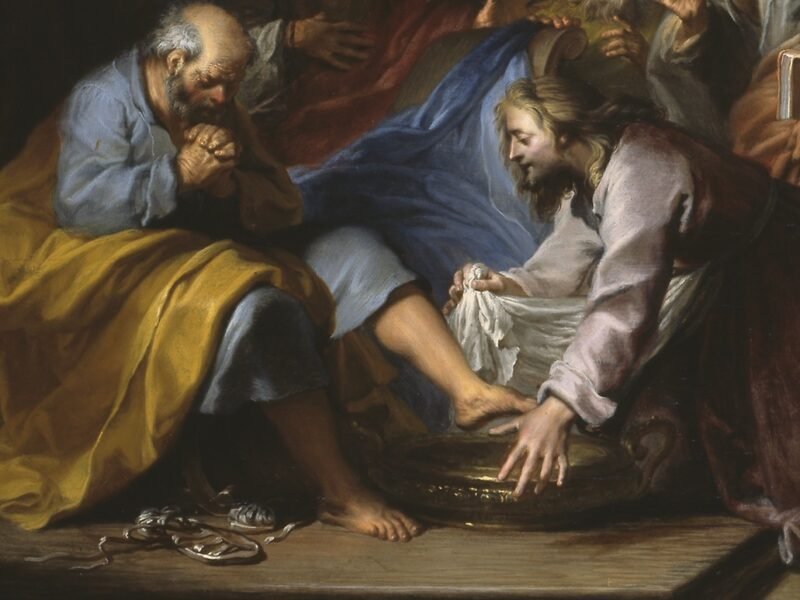Johnson was raised as a Baptist. By which I mean he was born in Georgia to parents who held a strong conviction against baptizing any infant who had not at least been to Vacation Bible School. Like most Baptist boys, he was a good Christian until round about the time he got his driver’s license.
After sowing three summers worth of wild oats in the general evangelical fashion, he was soundly converted by a missionary band from down at the High and Lifted Up Church of the Lowly Nazarene. But soon, his “entire sanctification” wore off entirely, and he began to hunger for something a bit more objectively verifiable. Two blessings just weren’t enough.
One of his friends, an Anglican chap by the name of Winston, began to tell him about Canterbury and liturgy. For the life of him he just couldn’t understand what chocolate eggs and lethargy had to do with something as sacred and vivifying as pure religion. But he had to admit that he was intrigued by the exploits of that King Henry fellow. “He must have been raised a Baptist too,” he mused.
Eventually curiosity got the best of him and he decided to slip quietly into Trinity Cathedral the next Sunday—at least as quietly as any self-respecting Nazarene could hope to be. To say that he was alarmed would be putting it mildly. To say that those Anglicans were mild would be putting it accurately. He had never been in such a quiet place before. At least not when people had been present. The congregation assembled in studied silence, kneeling on what seemed to him to be little individual mourner’s benches. “Surely they have all received the Holy Ghost by now,” he thought. “But then again, not if their decibel level is any indication.”
Then he heard the chiming of bells and caught a whiff of a strange burning odor. It smelled kind of like Yankee Candles infused with Christmas dinner. Suddenly, he was stricken with a sense of faint panic. “Is the place on fire?” But no one else seemed alarmed. Instead, the parishioners slid ever so slowly into their seats and waited with more noiselessness. “This must be what they mean by liturgy. That must just be the Elizabethan word for lethargy,” he concluded.
Then, from out of nowhere came a flock of men processing down the aisle wearing what looked to him like bed sheets fastened on by fishing ropes. As they marched forward, he surveyed all the various bits of furniture on the platform with quiet amusement. Then the men in dresses all took their seats facing one another in the front. The Bishop was absent that Sunday, so his chair was vacant. Johnson, being new to the whole scene but knowing that they valued symbolism, figured that the big empty throne was left open for a purpose. “Perhaps it is for an unseen guest. Maybe it’s for Rigor Mortis to set it,” he quipped to himself.
At once, an unseen choir began to sing a song in tongues, “Santas” or “Sand Tooths” or something. “At least they were open to the gifts of the Spirit,” he reckoned. Still, he wasn’t prepared for all of the movement: bowing, kneeling, standing, crossing, sitting, and then all of it all over again. They certainly seemed to move a lot for a people so bound up with lethargy.
But the longer he sat the more it grew on him—and within him. He was arrested with a sense of majesty; awed by the hallowed beauty of it all. He was moved by the prayers, even though they had been written down centuries before. The Scriptures seemed to be important to them too, since they read from them at least three different times, not including the verses they chanted like so many cloistered monks. The songs which were sung were unfamiliar, but not unwelcome to his hungry heart. “Some of these songs are even older than Bill Gaither,” he thought.
The sermon was short, but sobering and solid. The preacher, garbed in the tater sack, was able to bind all three of those earlier Bible readings together with neither sawdust nor that bit of foam that forms on the corners of the mouths of Holiness preachers. He spoke as one having authority, not as one of the Big Eva’s or Lesbyterians.
Then, just as he decided that everything was over, the robed figures gathered around the table. Now he was visibly uncomfortable. He was a stranger. This was not his Church; these were not his people. But much to his surprise, the gentleman in the gown reminded them that the table did not belong to the Anglican Church. “This is the Lord’s Table. And all of His baptized children are welcome to come and dine.” “This is my Church! These are my people!” Johnson exclaimed in his heart. In a moment, he gathered to eat at his Father’s table with family he was just meeting for the first time. He came into God’s banqueting house and the banner spread over him was love.
He left the service a little astonished at the place and a little astounded at himself. He felt as though he had wandered into a foreign land only to find it home. He wasn’t sure if this meant that he too had been overcome with lethargy; if he had received yet a third blessing—the benediction of Canterbury. But he did know one thing—he would be there again the next time the bells tolled and those big red doors swung open.






'A Canterbury Tale' has no comments
Be the first to comment this post!